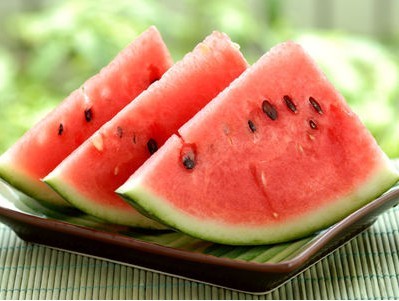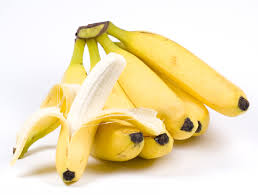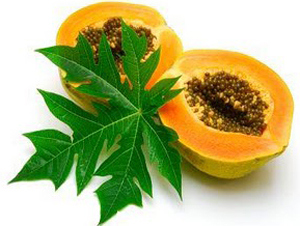|
Untitled Document
|
| |
Healthy Eating Guides |
| |
|
| |
Diet Vitamins |
| |
|
| |
|
|
|
|
|
|
|
|
| Vitamin B5 (Pantothenic Acid) |
|
|
|
|
|
| |
|
| |
|
| |
|
| |
 |
Watermelon |
| Watermelon is an excellent source of Vitamin-A, which is a powerful natural anti-oxidant. 100 g fresh fruit provides 569 mg or 19% of daily-required levels of this vitamin. It is essential for vision and immunity. Vitamin-A is also required for maintaining healthy mucus membranes and skin. Consumption of natural fruits rich in vitamin-A is known to protect from lung and oral cavity cancers. Watermelon fruit is a good source of potassium; Potassium is an important component of cell and body fluids that helps controlling heart rate and blood pressure; It thus offers protection against stroke and coronary heart diseases. Furthermore, it contains a good amount of vitamin-B6 (pyridoxine), thiamin (vitamin B-1), vitamin-C, and manganese. Consumption of foods rich in vitamin-C helps the body develop resistance against infectious agents and scavenge harmful oxygen-free radicals. Manganese is used by the body as a co-factor for the antioxidant enzyme, superoxide dismutase. |
|
| |
|
| |
|
| |
|
| |
 |
banana |
| The fruit contains a good amount of soluble dietary fiber (7% of DRA per 100 g) that helps normal bowel movements; thereby reducing constipation problems. It contains health promoting flavonoid poly-phenolic antioxidants such as lutein, zea-xanthin and a-carotenes in small amounts. These compounds help act as protective scavengers against oxygen-derived free radicals and reactive oxygen species (ROS) that play a role in aging and various disease processes. Fresh bananas provide adequate levels of minerals like copper, magnesium, and manganese. Magnesium is essential for bone strengthening and has a cardiac-protective role as well. Manganese is used by the body as a co-factor for the antioxidant enzyme, superoxide dismutase. Copper is required in the production of red blood cells. Fresh banana is a very rich source of potassium. 100 g fruit provides 358 mg potassium. Potassium is an important component of cell and body fluids that helps control heart rate and blood pressure, countering bad effects of sodium. |
|
| |
|
| |
|
| |
|
| |
 |
Pappaya |
| Papayas contain soft, easily digestible flesh with a good amount of soluble dietary fiber that helps to have normal bowel movements; thereby reducing constipation. Papaya fruit is also rich in many essential B-complex vitamins such as Folic acid, pyridoxine (vitamin B-6), riboflavin, and thiamin (vitamin B-1). These vitamins are essential in the sense that body requires them from external sources to replenish and play a vital role in metabolism. Fresh papaya also contains a good amount of potassium (257 mg per 100 g) and calcium. Potassium is an important component of cell and body fluids and helps controlling heart rate and blood pressure countering effects of sodium. Papaya has been proven natural remedy for many ailments. In traditional medicine, papaya seeds are anti-inflammatory, anti-parasitic, and analgesic, and they are used to treat stomachache and ringworm infections. |
|
| |
|
|